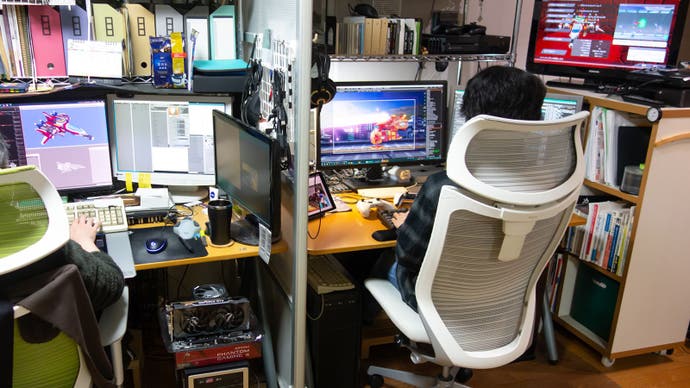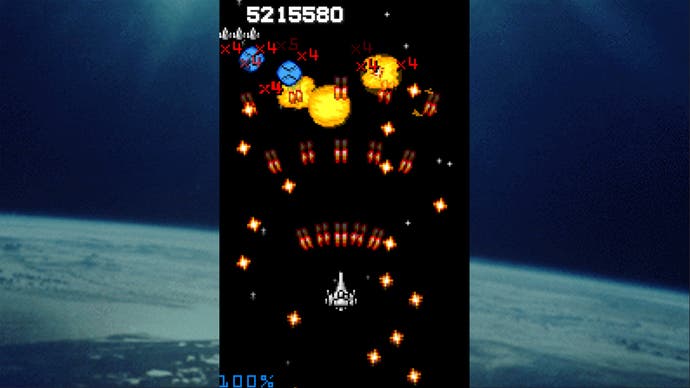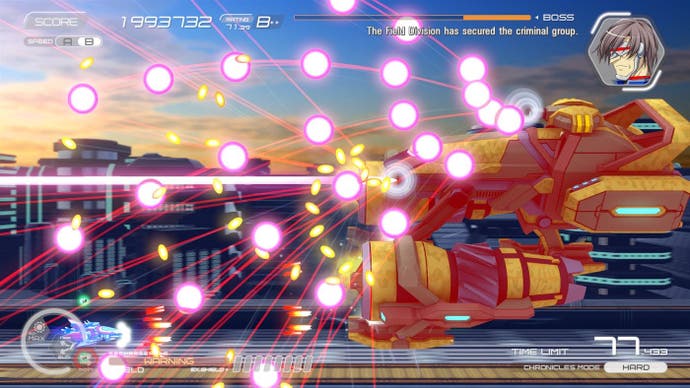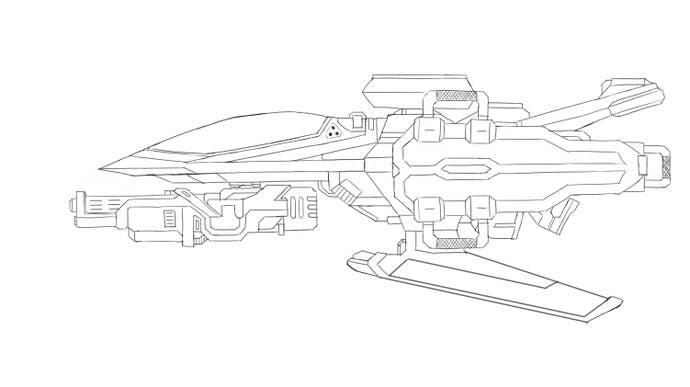Inside Qute: Natsuki Chronicles and the WonderSwan dev contest that started it all
Qute 'em ups.
When the Japanese technology and design company Qute Corporation released the WonderWitch game development kit a little over two decades ago, the team likely never guessed it would set them on a path to become one of the defining boutique studios of the modern shooting game form.
Qute may not court the attention from the mainstream that genre heavyweights Cave and Treasure so capably attract, but its creations are celebrated by genre devotees, and include some very sought after shmup collectibles. Yet behind all their cult status, Qute's library of releases remain relatively accessible in terms of their game and scoring systems, and are increasingly more available in the West. In fact, the team are still at it, having just taken their latest title Natsuki Chronicles to the PlayStation 4 and PC on these shores. It presents a remarkable, energetic horizontal shooter that is both a prequel and sequel to Qute's earlier game Ginga Force - and its story really begins at a fateful game development contest hosted back when bullet hell was increasingly asserting dominance over the wider genre.
Like so many boutique or cult shooting game developers - including Triangle Service, Success, G.Rev, Moss and Milestone - Qute has shown that in a genre that is arguably constrained by its own conventions, there remains ample room for the distinct. Compared to Cave's mesmerising intersecting bullet patterns, or Treasure's grand, atmospheric shmup operas, Qute's works have a rather different tone. While far from truly minimalist mechanically and aesthetically, they are to-the-point and pacey; uncluttered purebred shooters with understated charisma and a knack for the exhilarating. To enjoy a Qute release is to teeter on the boundary between attacking and defensive play, juggling those priorities as a delicate seasoning of random enemy placements nudge you away from complacency. Put simply, they are very good shooting games, if not entirely conventional.
And just as Qute's shooting games are distinct, so was its development kit. A game making platform for Bandai's WonderSwan family of handhelds, the WonderWitch was conceived with amateur coders in mind - though it used the C programming language, demanding a degree of proficiency not required to embrace today's hobbyist dev tools. One of the then-amateurs attracted to the WonderWitch was M-KAI - who like so many shooting game developers from the era chooses to practice his craft under a pseudonym.
As a youngster he had taught himself Z80 assembly in secret, choosing to keep his game making pastime private in a family environment that was at the time, he says, somewhat strict. M-KAI soon created several homebrew MSX shooters, but a yearning to build the bullet hell games he saw emerging around him meant he would quickly long for a more powerful creative platform.
The WonderWitch turned out to be that platform.
In November 2000, Qute launched the WonderWitch Grand Prix competition, encouraging amateur coders to push what was possible with the dev kit, while offering a ¥500,000 prize. M-KAI decided to enter the contest - commonly known as the 'WWGP 2001'. He was about to create an icon of the shooting game genre.
"Back then, I was also fascinated with the bullet hell STG that had just started to become popular and was trying my utmost on the MSX to keep up," M-KAI remembers. "But spec-wise, the MSX just couldn't deliver. It was at that moment, when the WonderWitch was released and it offered things like sprites, background features, [that] above all I discovered that even programming in the C language could offer a good amount of speed. So like a fish in water, I found my element."
The game M-KAI made for that competition was Judgement Silversword. It won WWGP 2001, and in 2004 was given a retail release by Qute for the WonderSwan Color. Today original copies of M-KAI's triumphant game go for £400 and up. Deemed a technical marvel at the time, Judgement Silversword - which many suggest was in-part inspired by Treasure's masterwork Radiant Silvergun - is perhaps the defining WonderSwan Color game. Collector lore contends that if you own a WonderSwan Color, you need a copy of Judgement Silversword to go with it.

Through that retail release - and by involving other WWGP 2001 entrants - Qute established a shooting game development team that collaborates to this very day. Yuuki Yonezawa received an honourable mention for his WWGP 2001 entry, before joining Qute, working across most of the studio's shooter catalogue. As well as serving as Natsuki Chronicles' director, lead designer and more besides, Yuuki has contributed to the sublime Eschatos, and more recently, Ginga Force.
At the time of WWGP 2001, M-KAI's friend Mach also became involved, initially providing something of a second opinion on the likes of Judgement Silversword.
"I met M-KAI in the same department at a company we worked together at back then," remembers Mach, who also eschews using his full name. "Discovering that we had a mutual interest in video games, we used to spend a lot of time together talking about games during our breaks. So, it's not a relationship like a doujin [or] hobby circle. We started to collaborate when M-KAI talked about making a STG for a WonderWitch programming competition and during the development, I used [to] play and review his work."
That casual collaboration would soon solidify into something more official, with Mach becoming M-KAI's main collaborator. He would go on to work on every Qute shooter with M-KAI, tackling much of the design of Ginga Force and Natsuki Chronicles.
It is also worth noting here that two other beloved shooting game makers were connected to the WWGP competitions - namely Kenta Cho of ABA Games, and doujin specialist Murasame Aeju. The WonderWitch's impact on shooting game design is profound, and too rarely recognised.
Back at Qute, just as WWGP 2001 established a team dynamic that exists to this day, Judgement Silversword established a gameplay personality absolutely evident in Natsuki Chronicles' new release. Qute's shooting games universally take a little from many of the genre's various sub-forms, meaning they never sit neatly in a single category. They are not pure bullet hell games, nor stalwarts for the design conventions of an earlier era, yet they evoke a sense of both.

"Looking at other STGs, I think it's mainly bullet hell ones with high difficulty or extremely simple looking ones in an 8-bit style," Yuuki posits. "At Qute, we tried to come up with something that is in between those yet still challenging. In other words, you could say that we are consciously trying to express something that's been lost over the years, and give them a modern twist."
It's that positioning that puts Qute's releases among the more accessible of the purebred shooters that came after the emergence of bullet hell through the 1990s. While none of the games are particularly easy on default settings, they give even the most casual shooter fan a good bit of playtime in every credit. And over time, the games have become a little more welcoming, perhaps thanks to a single, modestly sized team honing their craft collectively.
"I suppose we do we make games targeted towards the age group who used to play STGs in the past rather than hardcore STG players," offers Mach. "With Judgement Silversword and Cardinal Sins, they were developed as a mobile [handheld] game. Eschatos, as an arcade game. With Ginga Force and Natsuki Chronicles, they were developed as a home console game. With each game, we were conscious of the target audience for the various platforms but that doesn't mean to say that we just wanted to end up recreating something like a retro game specific to a certain platform."
"We really aimed for the most modern STG around when we started developing Natsuki Chronicles," Yuuki adds. "It's a proper traditional horizontal STG but has a very rich story, many weapons to unlock and a levelling up system. Also, I think it could be the first STG to implement a Bullet Trajectory Display System [which shows where bullets are headed before they reach the player] and we think this would surely improve the accessibility and playability a few gears. We've also really tried to cram everything we could possibly think of in terms of a horizontal STG format with what's possible with today's latest technology. In addition to all of that, we've included an Arcade Mode for a more traditional style of playing and designed it so that players ranging from hardcode STG fans to complete beginners can all enjoy playing the game."

Remarkably, Natsuki Chronicles does manage to serve hardcore and general fans in one - a significant accomplishment that has historically proven tricky for shooter developers that want to meet the needs of the most devoted score chasers without distancing the much wider audience of casually interested players.
So if you are looking to expand your shooter experience beyond the likes of Cave and Treasure, Qute is well worth your time, with Natsuki Chronicles offering a very contemporary starting point - and Judgement Silversword still feeling relevant on Steam some 20 years after its WWGP 2001 debut. There are other talented boutique shooting game outfits out there, of course, but Qute isn't quite like anyone else.
That fact is perhaps most evident in the shooters the team pick as most interesting or inspirational. While others might point to truly hardcore offerings such as Ketsui or Battle Garegga, Qute highlights the Mii Plaza shooter SteetPass Squad, Lucid Games' Geometry Wars 4, and 2018 indie game ZeroRanger.
All those came long after Qute first forged its shooting game formula, but in their own strange way, collectively they speak volumes about everything that followed.










